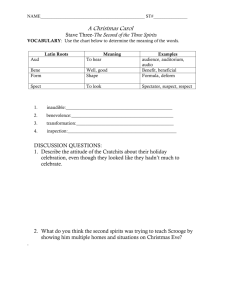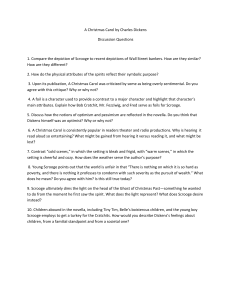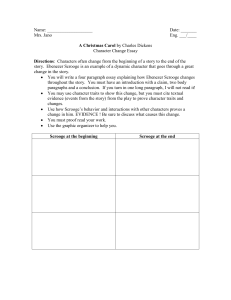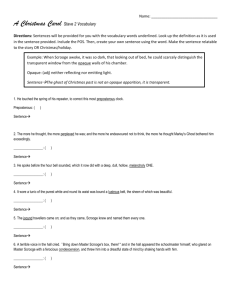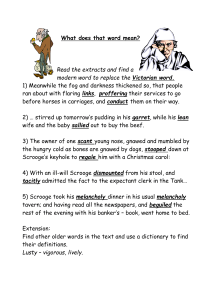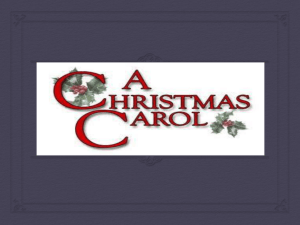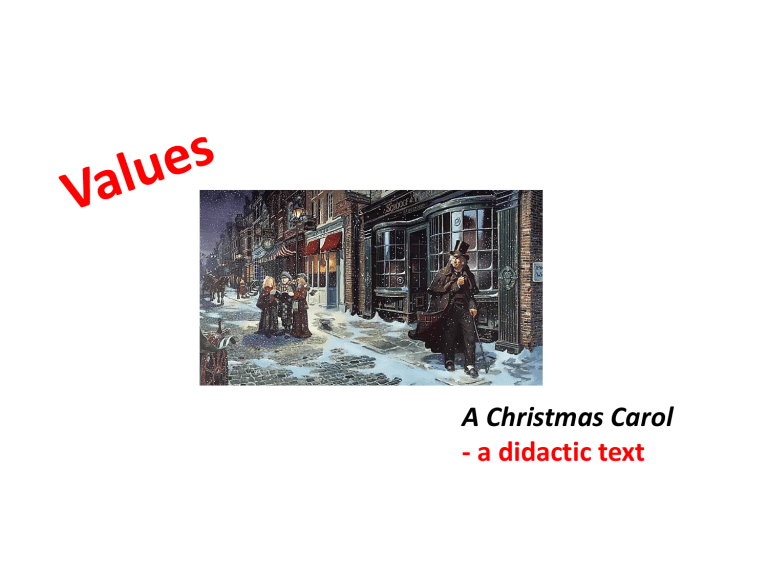
A Christmas Carol - a didactic text What is Dickens trying to teach the audience in A Christmas Carol? What are the values (what is shown to be important)? • People / Relationships – this is what is important in life • Money – danger of being obsessed with it and being tight-fisted, not generous to those in need (although it is good to use money to help others and to celebrate) • Celebration – seize the opportunity to have fun, enjoy celebrating with others, making those times special People / Relationships Scrooge had isolated himself from people • Ate and lived alone – ‘dreary enough, for nobody lived in it but Scrooge’ (p. 41) • Lost his fiancée • Rejects nephew’s invitation Contrast with Cratchit family ‘They were not a handsome family; they were not well dressed…But they were happy, grateful, pleased with one another, and contented with the time; and when they faded, and looked happier yet in the bright sprinklings of the Spirit’s torch at parting, Scrooge had his eye upon them, and especially on Tiny Tim, until the last.’ (p. 84) Scrooge, at the end, joins his nephew’s family and friends to celebrate Christmas and becomes Tiny Tim’s ‘second father’ (p. 116) Consequences of being obsessed with money and being tight fisted: • Can destroy Scrooge’s own life - Loneliness - Will die with no-one grieving him - Eternal torment (like Marley) ‘I wear the chain I forged in life.’ (p. 47) • Can destroy relationships - Example: Scrooge’s fiancé breaks off their engagement ‘Another Idol has displaced me…a golden one.’ • Oppression of others - Examples: Treatment of Bob Cratchit (limited coal, low wage) Refuses to give money to the portly gentlemen to help the poor Portly gentlemen: “Are there no prisons?” asked Scrooge… “And the Union workhouses?” demanded Scrooge. “Are they still in operation?”… “The Treadmill and the Poor Law are in full vigour, then?” said Scrooge… “If they would rather die,” said Scrooge, “they had better do it, and decrease the surplus population.” (p. 38 – 39) • Destruction of society - As illustrated in ‘Ignorance and Want’ ‘They are Man’s…This boy is Ignorance. This girl is Want. Beware them both…but most of all beware this boy, for on his brow I see that written which is Doom…’ (p. 94) Money can be used to make a difference: • Scrooge gives generously to the portly gentlemen • He transforms the fortunes of the Cratchit family by financially helping them. While others are ready to celebrate… Scrooge says, “Bah, humbug.” Page 35 – 36 “Christmas a humbug, uncle!” said Scrooge’s nephew. “You don’t mean that, I am sure.” “I do,” said Scrooge. “Merry Christmas! What right do you have to be merry? What reason do you have to be merry? You’re poor enough.” “Come then,” return the nephew gaily. “What right have you to be dismal? What reason have you to be morose? You’re rich enough.” Page 39 - 40 In the main street, at the corner of the court, some labourers were repairing the gas-pipes, and had lighted a great fire in a brazier, round which a party of ragged men and boys were gathered: warming their hands and winking their eyes before the blaze in rapture. The water-plug being left in solitude, its overflowings sullenly congealed, and turned to misanthropic ice. The brightness of the shops where holly sprigs and berries cracked in the lamp-heat of the windows, made pale faces ruddy as they passed. Poulterers’ and grocers’ trades became a splendid joke: a glorious pageant, with which it was next to impossible to believe that such dull principles as bargain and sale had anything to do. The Lord Mayor, in the stronghold of the mighty Mansion House, gave orders to his fifty cooks and butlers to keep Christmas as a Lord Mayor’s household should. Scrooge talking about Fezziwig (p. 64): “…He has the power to render us happy or unhappy; to make our service light or burdensome; a pleasure or a toil…The happiness he gives is quite as great as if it cost a fortune.” He felt the Spirit’s glance, and stopped. “What is the matter?” asked the Ghost. “Nothing particular,” said Scrooge. “Something, I think?” the Ghost insisted. “No,” said Scrooge, “No. I should like to be able to say a word or two to my clerk just now! That’s all.” Note examples: • miners • lighthouse keepers • sailors Read p. 85-86 • Key part of celebration and bringing people together • Universal (street scenes, Fezziwig’s, miners, lighthouse keepers) • Reflected in the title of the novella (and chapters called ‘staves’) ‘Scrooge took his melancholy dinner in his usual melancholy tavern.’ (p. 41) • Fezziwig’s party (p. 63) • The Ghost of Christmas Present (Heaped up on the floor… p. 72) • Long, effusive description of food on display in the street (p. 75-76) ‘Bob said he didn’t believe there ever was such a goose cooked. Its tenderness and flavour, size and cheapness, were the themes of universal admiration.’ (p. 81) “I’ll send it to Bob Cratchit,” whispered Scrooge, rubbing his hands and splitting with a laugh. Draw a mind-map of Dickens’ values: • People/Relationships • Money • Celebration Include: • examples • quotes • visual images
